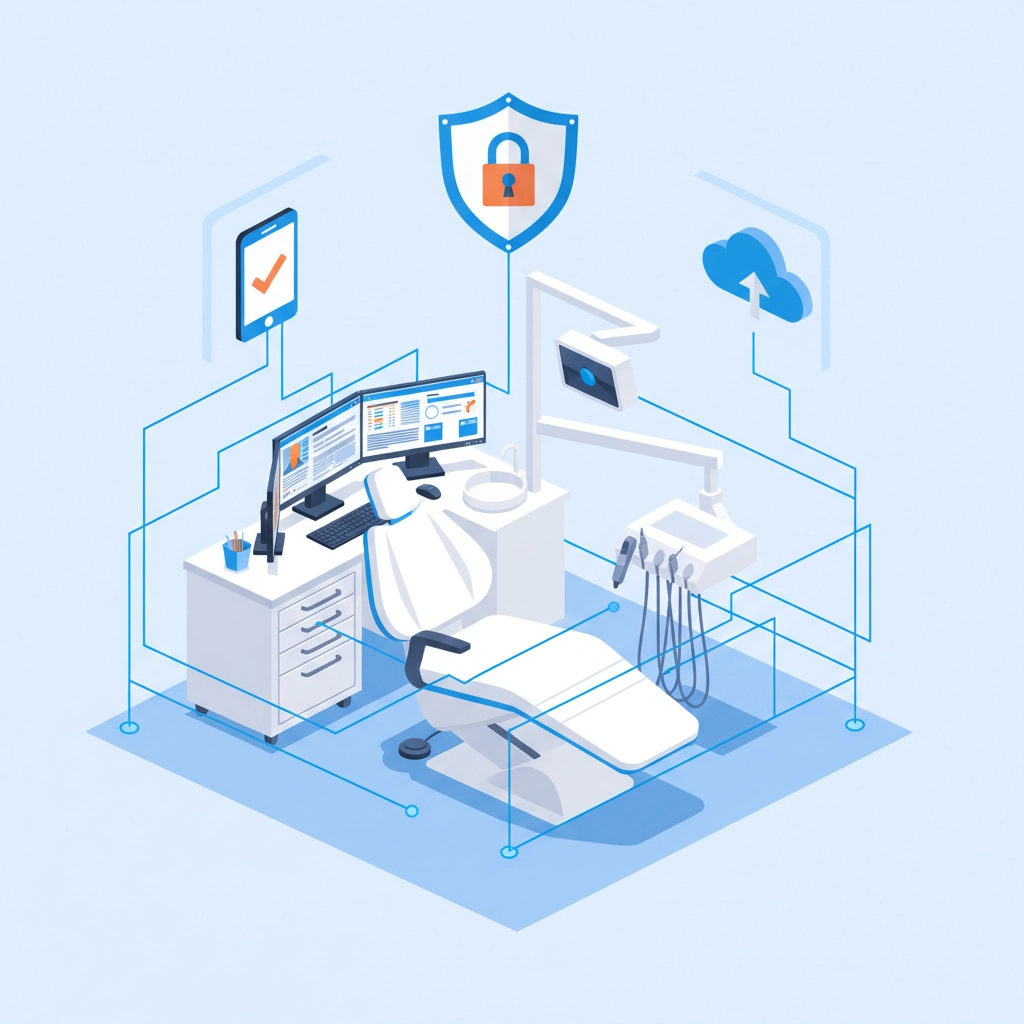Looking for HIPAA-compliant IT support feels like navigating a minefield. One wrong step, and your Connecticut dental practice could face fines that make a root canal look like a bargain. With penalties reaching up to $1.9 million per violation, choosing the right managed service provider isn't just about keeping your computers running: it's about protecting your practice's financial future and your patients' trust.
Here's the thing most dental practices don't realize: HIPAA compliance isn't a checkbox you tick once and forget. It's an ongoing process that touches every piece of technology in your office, from your patient management software to that Wi-Fi network your staff uses to check Instagram during lunch breaks. And with cyber threats targeting healthcare practices more aggressively than ever, having the right IT partner has become as critical as having malpractice insurance.

So what should Connecticut dental practices look for when choosing a managed IT service provider? After working with dozens of healthcare practices and seeing both spectacular successes and costly failures, here are the 10 non-negotiables that should be on your checklist.
1. Verify Genuine Dental Industry Expertise and Professional Endorsements
Not all IT companies are created equal, especially when it comes to healthcare. You want a provider that doesn't just claim to understand dental practices: you want one that lives and breathes the dental industry. Look for companies that can speak fluently about Dentrix, Eaglesoft, PracticeWorks, and other dental-specific software without needing to Google what they do.
Professional endorsements matter more than you might think. When the Connecticut State Dental Association or regional dental societies endorse an IT provider, they're putting their reputation on the line. These organizations have done the vetting work for you, ensuring the provider understands not just technology, but the unique workflow patterns of dental practices.
Ask potential providers about their experience with dental imaging systems like Carestream or intraoral cameras. Can they troubleshoot your digital X-ray sensors when they inevitably act up on a busy Monday morning? Do they understand the integration challenges between your practice management system and your digital imaging software? These aren't theoretical questions: they're real-world scenarios that happen every day in dental offices.
The right provider should also understand the unique scheduling challenges dental practices face. Unlike a typical small business, dental offices often have complex appointment types that require different technology setups. A simple cleaning might only need basic patient records access, while a root canal requires full imaging capabilities and potentially specialized software for endodontic planning.
2. Ensure Comprehensive Understanding of HIPAA's Three Critical Rules
HIPAA isn't a single rule: it's a comprehensive framework built on three foundational pillars that every Connecticut dental practice must follow religiously. Your IT provider needs to understand these rules not as abstract legal concepts, but as practical guidelines that shape every technology decision in your practice.
The Privacy Rule governs how you use and share Protected Health Information (PHI). This means every email containing patient information, every digital form transmission, and every remote access session must comply with strict privacy standards. Your IT provider should be able to explain exactly how their systems protect patient privacy and what procedures they have in place to prevent unauthorized access.
The Security Rule focuses specifically on electronic PHI (ePHI): essentially, any patient information stored or transmitted electronically. This rule is where most dental practices encounter technical challenges. Your digital X-rays, patient photos, treatment plans, insurance information, and appointment notes all fall under this rule. The provider you choose should have detailed protocols for encrypting this data both at rest and in transit.
The Breach Notification Rule requires you to report any unauthorized access to patient information within 60 days. This isn't just about major cyber attacks: it includes seemingly minor incidents like an employee accidentally emailing patient records to the wrong address or a laptop being stolen from a staff member's car. Your IT provider should have systems in place to detect potential breaches quickly and help you determine whether notification is required.
The complexity here is that these rules intersect with each other constantly. For example, when your hygienist accesses patient records from an operatory computer, that single action involves all three rules simultaneously. Your IT provider needs to understand these intersections and design systems that maintain compliance across all scenarios.
3. Demand Multi-Layered Cybersecurity That Goes Beyond Basic Antivirus
Traditional antivirus software is like bringing a water pistol to a gunfight when it comes to modern cyber threats. Today's ransomware attacks are sophisticated, targeted, and specifically designed to exploit healthcare practices. Your IT provider needs to offer comprehensive cybersecurity measures that create multiple layers of protection.
Endpoint detection and response (EDR) systems should be standard, not an add-on service. These systems monitor every computer and device in your practice for suspicious behavior, catching threats that traditional antivirus might miss. When a staff member clicks on a malicious email attachment, EDR systems can isolate that computer instantly, preventing the attack from spreading to your entire network.
Network segmentation is another critical component that many dental practices overlook. Your patient records system should be isolated from the computers staff use for personal browsing. Your digital imaging equipment should be on a separate network segment from your front desk computers. This way, if one part of your network gets compromised, the attackers can't easily access everything else.
Vulnerability management goes beyond just installing security patches. Your IT provider should conduct regular scans to identify weaknesses in your systems and prioritize fixes based on actual risk to your practice. They should also monitor the dark web for any mentions of your practice's information and alert you immediately if patient data appears to have been compromised.
Staff training often gets overlooked, but human error remains the leading cause of security breaches in dental practices. Your IT provider should offer regular training sessions that go beyond generic "don't click suspicious links" advice. They should provide specific scenarios relevant to dental practices, like how to verify the legitimacy of a dental supply company's email requesting payment information.

4. Insist on Comprehensive Encrypted Communication Solutions
Email encryption isn't optional for dental practices: it's a HIPAA requirement. But not all encryption solutions are created equal, and many practices make the mistake of choosing solutions that are either too complicated for staff to use consistently or too limited in functionality.
Look for providers that offer seamless encrypted email solutions that integrate with your existing email systems. Staff shouldn't need to remember to "turn on" encryption for patient-related emails: the system should automatically detect sensitive content and encrypt it appropriately. The recipient experience matters too; patients shouldn't need to jump through hoops to read important communications from your practice.
Secure patient portals have become essential, especially as patients increasingly expect digital communication options. However, these portals need to do more than just allow patients to view their records. They should enable secure messaging, appointment scheduling, treatment plan reviews, and financial communications. The portal should integrate seamlessly with your practice management system, eliminating the need for staff to manually sync information between systems.
Role-based access controls ensure that different staff members only see the patient information they need for their specific jobs. Your front desk staff might need access to scheduling and billing information but not detailed treatment notes. Dental assistants might need access to treatment histories but not financial records. Your IT provider should help you design access controls that match your practice's workflow while maintaining HIPAA compliance.
Mobile device management becomes critical as more dental practices adopt tablets and smartphones for patient care. When your dentist uses an iPad to show patients their X-rays or treatment plans, that device needs to be secured and managed centrally. Lost or stolen devices should be remotely wiped instantly, and all patient data should be encrypted both at rest and in transit.
5. Evaluate Comprehensive Disaster Recovery and Business Continuity Planning
Disasters don't always announce themselves with sirens and evacuation notices. Sometimes disaster looks like a server crash on a busy Monday morning when you have 30 patients scheduled. Sometimes it's a ransomware attack that encrypts all your patient records. Sometimes it's something as simple as a construction crew cutting your internet line, leaving your cloud-based practice management system inaccessible.
Your IT provider should have detailed disaster recovery plans that address both dramatic events and everyday technology failures. They should maintain HIPAA-compliant data backups that are tested regularly: not just created and forgotten. The testing part is crucial because many practices discover their backups are corrupted or incomplete only after they desperately need them.
Recovery time objectives (RTO) and recovery point objectives (RPO) might sound like technical jargon, but they translate to real-world impact on your practice. RTO determines how long you'll be without access to your systems after a failure. RPO determines how much data you might lose. For a dental practice, an RTO of 24 hours could mean cancelled appointments, frustrated patients, and significant revenue loss. Your IT provider should help you determine appropriate objectives based on your practice's specific needs and budget.
Business continuity planning goes beyond just data recovery. What happens if your primary office location becomes inaccessible? Can your staff work remotely to handle appointments, insurance claims, and patient communications? Can you quickly set up temporary operations at another location? These scenarios require advance planning and the right technology infrastructure to support them.
Regular disaster recovery testing should be scheduled during off-hours to avoid disrupting patient care. These tests should simulate real-world scenarios, not just simple data restoration exercises. Your staff should be trained on emergency procedures and know exactly what to do if primary systems become unavailable.
6. Assess Vendor Management and Integration Capabilities
Dental practices typically work with numerous technology vendors: practice management software companies, digital imaging vendors, payment processors, insurance clearinghouses, and more. Managing relationships with all these vendors can consume significant time and often leads to finger-pointing when problems arise.
A quality managed IT provider should act as your single point of contact for technology-related vendor issues. When your digital imaging system stops communicating with your practice management software, you shouldn't have to coordinate between multiple vendors to resolve the problem. Your IT provider should handle those communications and ensure problems get fixed quickly.
Integration expertise becomes critical as dental practices adopt more specialized software solutions. Your intraoral camera should seamlessly integrate with your imaging software. Your appointment scheduling system should communicate with your payment processing system. Your insurance verification tools should automatically update patient records. These integrations require deep technical knowledge and ongoing maintenance.
Vendor evaluation services can save practices from costly mistakes. When you're considering new software or equipment, your IT provider should be able to assess whether it will integrate properly with your existing systems and meet HIPAA compliance requirements. They should also help negotiate contracts and service level agreements to ensure you get appropriate support and protection.
Change management becomes essential as your practice grows and technology evolves. Your IT provider should help plan and execute technology changes in ways that minimize disruption to patient care. This includes scheduling updates during off-hours, providing staff training on new systems, and ensuring backup procedures are in place during transitions.
7. Verify 24/7 Monitoring and Truly Proactive Support
Dental practices can't afford to discover problems when staff arrive in the morning to find that computers won't boot up or the practice management system is running slowly. Quality IT providers offer 24/7 monitoring that catches and resolves problems before they impact patient care.
Proactive monitoring goes beyond just checking if systems are online. It involves monitoring system performance, identifying developing issues, and resolving them before they become problems. When your server's hard drive starts showing signs of potential failure, you want to know about it immediately: not when it finally crashes during a busy afternoon of appointments.
Alert prioritization matters because not all IT issues require immediate attention. A printer running low on toner might generate an alert, but it shouldn't wake up the on-call technician at 2 AM. However, signs of potential security threats or system failures should trigger immediate response procedures. Your IT provider should work with you to define appropriate alert levels and response times.
Help desk support quality varies dramatically between providers. You want support staff who understand dental practice workflows and can provide solutions quickly. When your front desk staff can't access patient scheduling, the help desk should be able to provide immediate assistance or temporary workarounds while resolving the underlying issue.
Remote support capabilities have become essential, especially as practices adopt more cloud-based solutions. Your IT provider should be able to diagnose and resolve most issues remotely without requiring on-site visits. This speeds up problem resolution and reduces costs for routine maintenance and support tasks.

8. Confirm Hardware and Dental-Specific Equipment Expertise
Dental practices use specialized equipment that requires specific IT expertise. Digital X-ray sensors, intraoral cameras, cone beam CT scanners, and CAD/CAM systems all require proper network configuration and ongoing technical support. Your IT provider should have experience installing, configuring, and maintaining these specialized devices.
Network infrastructure requirements for dental equipment often exceed those of typical small businesses. High-resolution imaging files require sufficient bandwidth and storage capacity. Real-time imaging during procedures requires low-latency network connections. Your IT provider should understand these requirements and design network infrastructure accordingly.
Equipment lifecycle management helps practices plan for technology replacements before equipment failures disrupt patient care. Dental equipment is expensive, and practices need to budget appropriately for replacements and upgrades. Your IT provider should track equipment age and performance, providing recommendations for replacements based on both technical considerations and business impact.
Integration challenges between different manufacturers' equipment require specialized knowledge. For example, connecting a new intraoral camera to an existing imaging system might require specific drivers, network configurations, or software updates. Your IT provider should handle these integrations smoothly without disrupting existing workflows.
Mobile device support has become increasingly important as dental practices adopt tablets and smartphones for patient education and record keeping. These devices need to be properly configured for HIPAA compliance, integrated with practice management systems, and secured against loss or theft.
9. Evaluate True Cost-Effectiveness and Budget Predictability
The cost of proper IT security and HIPAA compliance often costs less than a single month's potential violation fine. However, practices need to evaluate total cost of ownership, not just monthly service fees. Hidden costs can include additional charges for after-hours support, software licensing, hardware maintenance, and compliance reporting.
Transparent pricing models should clearly outline what services are included in base pricing and what constitutes additional charges. Some providers offer seemingly low monthly fees but charge extra for every service call or software update. Others provide comprehensive service packages that include most routine support activities.
Budget predictability becomes crucial for practice financial planning. Unexpected IT expenses can significantly impact cash flow, especially for smaller practices. Look for providers that offer fixed monthly pricing for most services, with clear guidelines about what circumstances might result in additional charges.
Return on investment calculations should consider both cost savings and revenue protection. Proper IT systems can improve practice efficiency, reduce staff time spent on technology issues, and prevent costly data breaches. They also enable practices to adopt new technologies that can improve patient care and increase revenue.
Scalability planning ensures that your IT costs remain reasonable as your practice grows. Adding new staff members or operatories shouldn't result in dramatic cost increases. Your IT provider should offer pricing models that scale appropriately with practice growth.
10. Demand Ongoing Compliance Support and Risk Assessment Services
HIPAA compliance isn't a one-time achievement: it's an ongoing process that requires regular assessment and updates. Your IT provider should offer regular compliance audits that identify potential vulnerabilities and provide specific recommendations for addressing them.
Risk assessment services should be comprehensive and specific to your practice. Generic compliance checklists aren't sufficient for dental practices, which have unique technology requirements and risk profiles. Your provider should understand the specific threats facing dental practices and help you implement appropriate protections.
Documentation support becomes critical during compliance audits or breach investigations. Your IT provider should help maintain detailed records of security measures, staff training, risk assessments, and incident responses. This documentation demonstrates your practice's commitment to HIPAA compliance and can help minimize penalties if violations occur.
Policy development and updates require ongoing attention as technology and regulations evolve. Your practice's HIPAA policies should be living documents that get updated regularly to reflect new technologies, procedures, and regulatory requirements. Your IT provider should help keep these policies current and ensure staff understand their obligations.
Incident response planning prepares your practice for potential security breaches. Your IT provider should help develop detailed response procedures, including steps for containing breaches, assessing their scope, notifying appropriate parties, and implementing corrective measures. These procedures should be tested regularly through tabletop exercises or simulated incidents.

Making Your Decision: Questions to Ask Potential Providers
Before making your final decision, ask each potential provider these specific questions:
- Can you provide references from at least three Connecticut dental practices currently using your services?
- What specific experience do you have with [your practice management software]?
- How do you handle emergency support outside normal business hours?
- What is your average response time for critical issues affecting patient care?
- Can you provide a detailed breakdown of all potential costs over the next three years?
- How do you stay current with HIPAA regulatory changes?
- What happens if a staff member accidentally sends patient information to the wrong email address?
- How quickly can you restore our systems if our server crashes?
- What training do you provide for our staff on new systems and security procedures?
The Bottom Line: Your Practice's Future Depends on This Decision
Choosing the right IT provider for your Connecticut dental practice isn't just about technology: it's about protecting your patients, your reputation, and your livelihood. The right provider will give you peace of mind, knowing that your systems are secure, compliant, and reliable. The wrong provider could expose you to devastating fines, security breaches, and operational disruptions.
Don't make this decision based solely on price or promises. Look for providers with proven experience in dental practices, comprehensive HIPAA knowledge, and a track record of successful implementations. Ask hard questions, check references thoroughly, and ensure the provider can support your practice's specific needs both today and as you grow.
Remember, in healthcare IT, there's no such thing as "good enough." Your patients trust you with their most sensitive information, and you need an IT partner who takes that responsibility as seriously as you do. The right provider becomes an extension of your team, working behind the scenes to ensure that technology enhances your practice rather than creating headaches.
The investment in proper HIPAA-compliant IT support pays dividends in reduced stress, improved efficiency, and most importantly, the peace of mind that comes from knowing you're protecting your patients' information and your practice's future. Don't wait until a crisis forces your hand: start evaluating providers today and make the choice that will serve your practice well for years to come.
At FoxPowerIT, we understand the unique challenges Connecticut dental practices face. We've helped dozens of healthcare providers navigate HIPAA compliance while maintaining the reliable, efficient IT systems they need to serve their patients. If you're ready to discuss how we can help protect and enhance your practice, we'd welcome the conversation.

